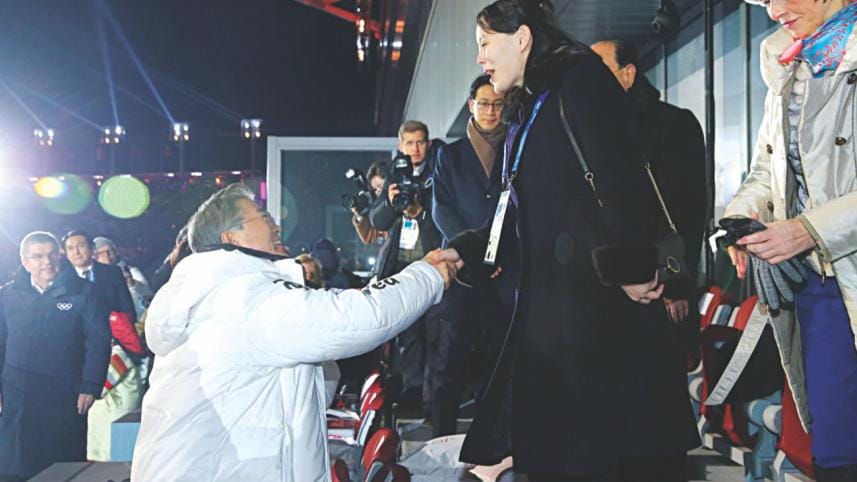Historic show of Koreas' unity
march under one flag, Kim Jong Un's sister,
South's president shake hands

The two Koreas marched together under one flag and South Korea's president shared a historic handshake with Kim Jong Un's sister as the Pyeongchang Winter Olympics opened in a spirit of intense rapprochement yesterday.
At a glittering ceremony, South and North Korea brought the crowd to its feet as they entered behind the blue-and-white Korean unification flag.
South Korean President Moon Jae-in shook the hand of a smiling Kim Yo Jong, the powerful sister of North Korean leader Kim Jong Un, as he entered the VIP seating section, and again as the Korean athletes marched.
It cemented what has been a rapid improvement in Korean ties since North Korea -- after months of fierce nuclear rhetoric and missile tests -- agreed last month to attend its first Olympics in the South.
Kim Yo Jong, the first member of the North's ruling dynasty to venture South since the Korean War, forms part of the highest level delegation ever to cross the border.
South and North Korea last marched together at the 2006 Winter Olympics in Turin. They also made the symbolic gesture at the opening of the 2000 and 2004 Olympics in Sydney and Athens.
"You will inspire us all to live together in peace and harmony despite all the differences we have," said International Olympic Committee president Thomas Bach, before Moon declared the Games open.
In highly unusual scenes, hawkish US Vice President Mike Pence sat directly in front of the North Korean delegation.
Pence -- who has not ruled out a meeting with the North's delegates -- yesterday called Pyongyang "the most tyrannical regime on the planet".
Kim Yo Jong was part of a diplomatic delegation led by ceremonial head of state Kim Yong Nam -- the highest-level North Korean official ever to go to the South -- as the Games trigger a diplomatic rapprochement between the rivals.
Ahead of the opening ceremony the South's President Moon shook hands with Kim Yong Nam at a leaders' gathering in Pyeongchang, but Seoul's Blue House said Pence did not and left before the event ended.
Both Washington and Tokyo are regularly threatened by Pyongyang, but Japanese Prime Minister Shinzo Abe did shake hands and exchange words with Kim, Seoul's spokesman said.
Moon was scheduled to have lunch with the Pyongyang delegation later yesterday.
The last member of the Kim family to set foot in Seoul was Yo Jong's grandfather Kim Il Sung, the North's founder, after his forces invaded in 1950 and the capital fell.
Three years later the conflict ended with a ceasefire rather than a peace treaty, leaving the two sides technically in a state of war.
Now the North is subject to multiple rounds of UN Security Council sanctions over its banned nuclear weapons and ballistic missile programmes, while the democratic South has risen to become the world's 11th-largest economy.
The delegation's trip is the diplomatic high point of a Games-driven rapprochement between the two Koreas, with the dovish Moon pushing a "peace Olympics" that will open a door for dialogue to alleviate tensions and seek to persuade Pyongyang to give up its atomic ambitions.
But all eyes are on Yo Jong -- a key member of the Kim dynasty that has ruled the impoverished, isolated nation with an iron fist and pervasive personality cult over three generations.
Many analysts suggest Yo Jong may be carrying a personal message to Moon from her brother.
Tensions have been high on the peninsula since last year when the North staged its sixth and most powerful nuclear blast and test-fired intercontinental ballistic missiles (ICBMS) capable of reaching the US mainland.
Leader Kim and US President Donald Trump exchanged threats of war and personal insults, sparking global alarm and fears of a new conflict on the peninsula.
But Kim abruptly announced a plan to send athletes and high-level delegates to the Pyeongchang Winter Games in his new year speech, setting in motion a flurry of cross-border talks and trips.
The announcement -- following months of cajoling by Seoul -- is seen as a bid to defuse tensions and seek a loosening of the sanctions against it.
But Pyongyang also held a military parade the same day, displaying its hulking ICBMs in Kim Il Sung Square in a show of strength, and the diplomatic manoeuvres have met a backlash in the South, with many accusing Seoul of making too many concessions to its wayward neighbour.
Lee Hee-beom, head of the Games organising committee, said "the North and South have become one through the Olympics".
"Pyeongchang Olympics will become the hope and light for everyone that hopes for peace, not only on the Korean peninsula but in northeast Asia and the entire world," said Lee.
The Games end on February 25.
 For all latest news, follow The Daily Star's Google News channel.
For all latest news, follow The Daily Star's Google News channel.
Comments